“Things fall apart; the centre cannot hold; Mere anarchy is loosed upon the world, …”. Taken from W.B. Yeats’ famous poem, The Second Coming, the Irish poet wrote these lines in 1919, right after World War I and when humanity was in the grip of the Spanish flu pandemic. Just over a century later, these fearful words are ringing in people’s ears once again as we struggle with the previously-unthinkable disruptions unleashed by COVID-19.
Yet out of the chaos, it appears that a new order has emerged. While COVID-19 has exacted a heavy toll on society, things have not completely fallen apart. One of NUS’ biggest challenges over the last two years has been how to hold up its own centre — namely, its vision as “a leading global university shaping the future” — in the absence of international travel. Adaptation is the name of the game. Whether by organising virtual exchange programmes and remote internships for students, keeping tabs on new developments in overseas research institutes, or leveraging its 333,000-strong global alumni network, NUS has found a way to stay connected to the wider world.
CROSSING BORDERS, ONLINE
As soon as the gravity of the COVID-19 situation became clear in March 2020, one of NUS’ most urgent priorities was to ensure the safe and speedy return to Singapore of all of its students studying abroad at the time, including some 1,300 on the Student Exchange Programme (SEP) all over the world and 250 in NUS Overseas Colleges (NOC) entrepreneurial hotspots. University administrators then had to formulate an alternative plan so that students could still get some international exposure, albeit not in person.
The Global Relations Office (GRO), for its part, rolled out a number of innovative outbound educational offerings, in lieu of the currently-suspended SEP, to help students develop a global mindset despite the travel restrictions. Summer programmes, research attachments and study trips were conducted online, and new initiatives including joint virtual immersion programmes with other universities were introduced. “NUS’ active participation in global university networks to co-develop impactful programmes, especially in Asia, has not diminished in this pandemic. We have worked with many partner universities and embassies, such as those in the UAE, Israel, Thailand, Indonesia, China, India and Rwanda,” says Associate Professor Reuben Wong (Arts and Social Sciences ’93), Associate Vice President (Global Relations) of NUS.
NOT FAR AWAY

An out-of-the-box solution to the pandemic that was created by four local universities including NUS is the
Singapore Universities Student Exchange Programme (SUSEP), under which students in one university can take a full or partial semester at any of the other three institutions. While a local exchange may not be their first choice, Assoc Prof Reuben Wong notes that students can nonetheless “experience a different learning environment, interact with students and professors across different university campuses, and take modules to complement those of their home institution.”
NUS is also tapping on its membership in university alliances to create global learning opportunities for students. As a member of Universitas 21 (U21) — a global network of 27 research-intensive universities — NUS encourages its students to attend the U21 Global Citizenship online programme, targeted at those who aspire to advance the United Nations (UN) Sustainable Development Goals. The University Alliance in Talent Education Development (UAiTED) — an Asia-wide academic network of universities in Singapore, Malaysia, Hong Kong and Taiwan — recently wrapped up its 2021 UAiTED Innovation Competition, where NUS students worked virtually with peers in cross-institutional and cross-regional teams to propose innovative solutions for a better and more sustainable future. In addition, through the International Alliance of Research Universities (IARU) and the Association of Pacific Rim Universities (APRU), NUS students can choose from a wide range of virtual courses and co-curricular programmes offered by partner universities.
Although the inability to travel is no doubt a missed opportunity, these online offerings do have their merits. Ms Chua Bi Quan (Business ’09), Assistant Senior Manager of GRO and NUS’ Key Contact for IARU, points out that students can still “gain new content knowledge, forge friendships with students from across the world, and make good use of their vacation time to learn in a system that is different from NUS”. The virtual format may even provide “flexible learning opportunities” for those who otherwise would not be able to study overseas due to the demands of their degree programme, she adds. “Students can make use of the difference in time zones to engage in other activities during the day and participate in their [online] course at night.”
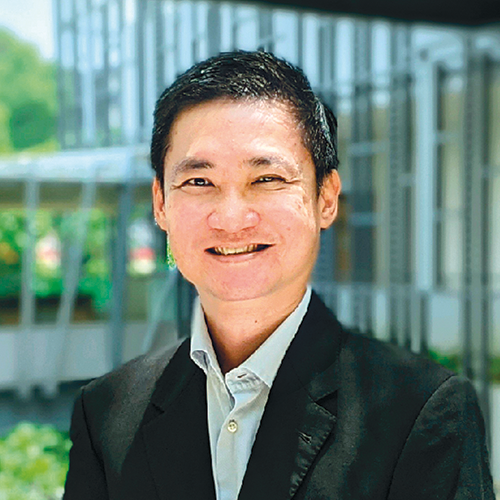
NUS’ active participation in global university networks to co-develop impactful programmes, especially in Asia, has not diminished in this pandemic.
Associate Professor Reuben Wong, Associate Vice President (Global Relations), NUS
HOME AWAY FROM HOME
On the flip side, NUS is also doing its best to support international students who are still committed to studying at NUS, despite the pandemic. There may be fewer of them at present, given the suspension of inbound exchange programmes under the SEP for all countries (except China and Hong Kong). However, the University still welcomed a decent-sized contingent of international freshmen from Indonesia, Malaysia, India and elsewhere at the start of this academic year as well as the preceding one. For them, the first-rate education offered by NUS and its vibrant student life — not to mention Singapore’s effective COVID-19 containment strategy — outweighed any reservations they may have had about moving to a foreign country in the middle of a public health crisis.
The usual slate of welcome events organised to help international first-year students acclimatise to life in NUS has not ceased either; it has just shifted online. In July and August 2021, these international students joined virtual orientation programmes run by their respective halls and faculties, found out about the various co-curricular activities through Zoom and YouTube Live at the NUS Student Life Fair, and got tips from seniors on adapting to their new environment at the Office of Student Affairs (OSA) Live Show.
iCARE Week, a three-day online event where international students interacted with local peers over games and ice-breaking activities, was also part of the line-up. It was initiated by the student club NUS iCARE, which normally holds food and cultural tours around Singapore to help international students feel at home here. Though not ideal, the online platform served as a safe way to continue facilitating friendships between local and foreign students and promoting cross-cultural appreciation.
![]()
As we could only see one another through the screen, it felt slightly impersonal. However, I’m thankful we were still able to bond and appreciate cultures through Zoom.
Ms Rachel Tan, iCARE Week Project Director
“As we could only see one another through the screen, it felt slightly impersonal,” says iCARE Week Project Director Ms Rachel Tan. An international student herself, the Malaysian is currently in her second year at NUS’ Faculty of Arts and Social Sciences. She adds, “However, I’m thankful we were still able to bond and appreciate cultures through Zoom.” For instance, participants played a matching game which exposed them to ‘Singlish’ words and phrases. Holding the event online also had the advantage of allowing a larger group of students to join in the activities than would have been possible in person.
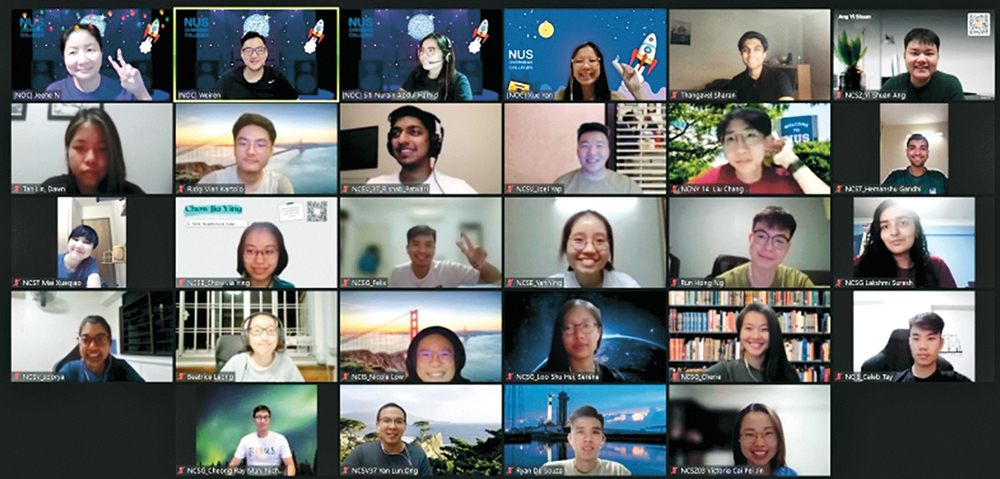 An e-Jamboree in May 2021 welcomed new NOC alumni who had just completed the programme.
An e-Jamboree in May 2021 welcomed new NOC alumni who had just completed the programme.
 NOC alumni spoke at an entrepreneurship-themed fireside chat organised by NUS Centre for Future-ready Graduates in June 2021.
NOC alumni spoke at an entrepreneurship-themed fireside chat organised by NUS Centre for Future-ready Graduates in June 2021.
FROM START-UP TO SCALE-UP
Just as GRO has provided a suite of online opportunities to broaden the horizons of students stuck in Singapore, NUS Enterprise — the entrepreneurial arm of the University — has done the same for students in its flagship NOC programme. “We did not pause NOC, but have continued to conduct and replicate as much of the experience as possible,” says Professor Chee Yeow Meng, Associate Vice President (Innovation & Enterprise) of NUS and Director of NOC. “Students are organised according to their location of preference and placed in remote internships with our start-up partners at those locations.”
Much of this would not have been possible without the support of previous NOC batches. To ensure current students would not miss out on entrepreneurial exposure, NOC alumni have stepped up to help their juniors during this period. Some hired more student interns at their own companies (both inside and outside Singapore), while others rallied their networks and former NOC employers to take in interns. A number of NOC alumni companies have followed up by offering traineeships and full-time positions to graduating students facing a tough job market.
Indeed, the close-knit nature of the global NOC community has stayed intact through the pandemic. For example, this year’s e-Jamboree and NOC Alumni Homecoming (a hybrid event) allowed NOC alumni to connect with one another from wherever they were. NOC alumni can also share their knowledge and experiences virtually through a new series of NOC Masterclasses, in addition to speaking engagements organised by other parties.
THERE’S NOTHING LIKE THE REAL THING

Pivoting online is the best (and often the only) option so long as the COVID-19 threat does not abate, but as Prof Chee points out, there is one drawback: “Virtual attendance is not able to fully replace the [face-to-face] interactions … that are so effective in growing networks and building connections.” As Singapore transitions to a ‘living with endemic COVID’ model and gradually loosens border controls, NUS plans to allow fully-vaccinated students to travel to selected NOC locations from as early as October 2021. The SEP will also resume in most countries in January 2022, barring any worsening of the COVID-19 situation.
Out of the NOC programme as well as benefitting from NUS Enterprise’s incubation support, numerous successful start-ups have been hatched — none more notable than Mr Jeffrey Tiong’s (Engineering ’07) PatSnap, which in March 2021 became the first NUS Enterprise-supported company to achieve ‘unicorn’ status (i.e. a privately-held start-up valued at over US$1 billion). But Prof Chee plans to strengthen NUS’ entrepreneurial reputation even further, and expand the global start-up and innovation ecosystem, by moving to the next phase of “venture creation”.
He describes it thus: “In the past, we focused on providing education to students — through NOC — and changing their mindsets to give them the confidence to create ventures, and then left them on their own after that. To use a cooking analogy, we used to just provide a chef with the ingredients. Now we want to be more deliberate and help the chef cook as delicious a dish as possible, by offering more post-NOC support.”
In particular, NUS Enterprise is ramping up support for NOC alumni in four areas:
- Talent. A list of CEOs with entrepreneurial expertise has been drawn up, from which teams are paired with a suitable candidate to help develop their ventures.
- Money. A fund has been set up to invest in companies which are spun off from NUS.
- Technology. Through the NUS Graduate Research Innovation Programme (GRIP), postgraduate students and researchers receive guidance to transform research into their own deep tech companies.
- Market access. Local start-ups can venture abroad through NUS’ global network of entrepreneurial hubs including BLOCK71 and NUS Research Institutes in China (NUSRI China), which support a two-way flow of talent, technologies and start-ups between the respective countries and Singapore.
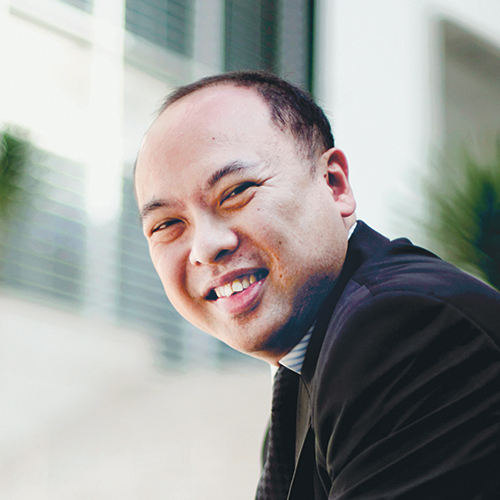
By and large, the pandemic did not affect our venture-creation strategy. We just had to find different ways of executing it.
Professor Chee Yeow Meng, Associate Vice President (Innovation & Enterprise), NUS
“By and large, the pandemic did not affect our venture-creation strategy. We just had to find different ways of executing it,” says Prof Chee. That means doing things online. Like NOC students who are interning remotely, participating teams in GRIP can either work from home or adhere to safe management measures on campus. BLOCK71 recently opened a new hub in Ho Chi Minh City (Vietnam), and will soon establish its presence in Nagoya (Japan) and Chongqing (China). And in August 2021, Singapore companies wanting to enter the Chongqing market took part in a week-long virtual immersion programme co-organised by the Infocomm Media Development Authority (IMDA), NUS Enterprise and BLOCK71.
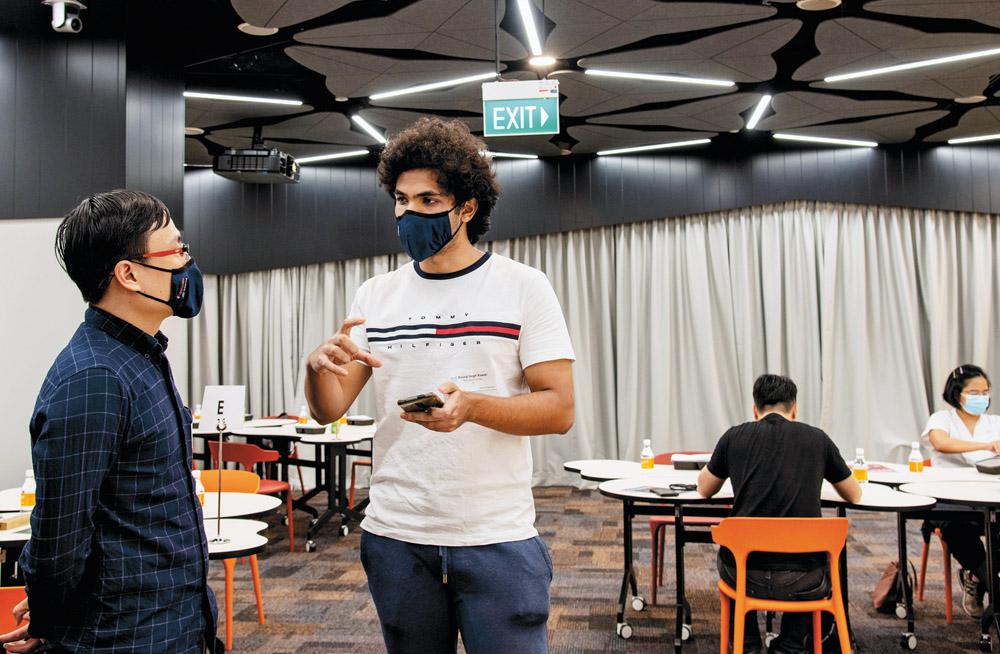 A hybrid event, the NOC Alumni Homecoming 2021 was attended by guests both in-person and virtually.
A hybrid event, the NOC Alumni Homecoming 2021 was attended by guests both in-person and virtually.
TO CHINA, AND BEYOND
It might seem ill-advised for businesses to attempt international expansion in such times of turmoil, and for some, that may well be true. However, Prof Chee says, “It’s important to help our companies internationalise because the Singapore market is so small. If they want to grow, they have to be ‘born global’ almost from day one.” Moreover, although some industries have been hit hard by COVID-19, he notes that “the digital sector is still doing very well — and most of our start-ups are in the digital space.”
As the world’s second-largest economy, China represents one of the biggest markets for NUS Enterprise-supported companies. This is reflected not only in the fact that there are two BLOCK71 Suzhou incubation spaces located in the Chinese city, but also through the four research institutes which have been set up under the NUSRI China programme. Over the last decade, NUS has steadily increased its presence in China, thus enhancing Sino-Singapore cooperation in research, education and enterprise activities, and extending the University’s sphere of influence internationally.
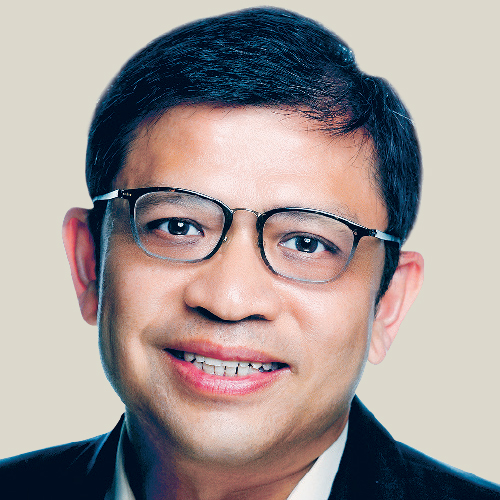
Given the huge market size in China, there are also ample opportunities for start-ups and companies from NUS (and Singapore) to do business there and translate their research for application and commercialisation.
Mr George Loh, Director, NUSRI China
Mr George Loh, Director of the NUSRI China programme, elaborates on the win-win outcomes for both countries: “NUS, being a research-intensive university, has to work with the best researchers globally. In fact, we have a global responsibility to train the best talent for the world. Our partners in China will benefit from talent development by a world-class university like NUS, while we will benefit from the Chinese PhD students who do excellent research under the supervision of NUS professors. Given the huge market size in China, there are also ample opportunities for start-ups and companies from NUS (and Singapore) to do business there and translate their research for application and commercialisation.”
Founded in 2010, NUS (Suzhou) Research Institute (NUSRI-SZ) is NUS’ first overseas research institute, and the first to be independently set up by a foreign university in China. It contributes to China’s rapid economic growth through research in three core areas: environmental and energy nanotechnology; food science and technology; and smart medical technology. NUSRI-SZ also supports NUS Enterprise in managing one of the BLOCK71 Suzhou facilities, which enables companies housed there to tap on NUSRI-SZ’s research and technology expertise, thus boosting commercialisation of NUS’ intellectual property outside of Singapore.
PYP-ed to the Post
Collaborating with top talent based overseas is one way NUS burnishes its global credentials as a research-intensive university. Bringing the best and the brightest to Singapore is another. In 2018, NUS introduced the Presidential Young Professorship (PYP) scheme, which aims to attract and recruit young academics — local and foreign — with excellent research track records in their respective fields.
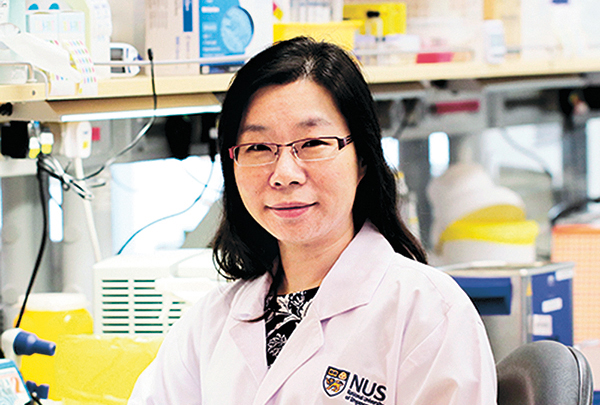 Dr Shao Huilin.
Dr Shao Huilin.
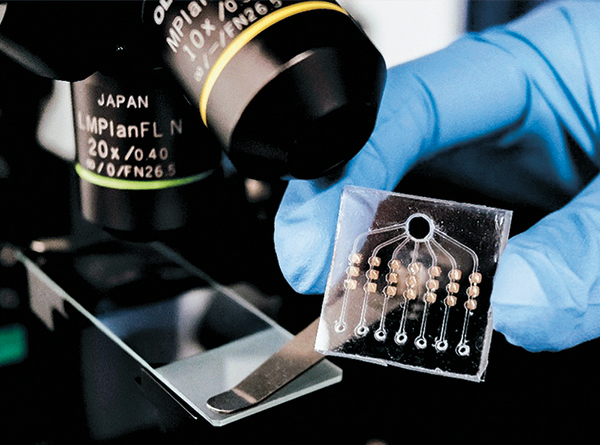 The ExoSCOPE nanotechnology platform.
The ExoSCOPE nanotechnology platform.
Within the field of biomedical engineering, NUS Presidential Young Professor Shao Huilin and her research lab recently made headlines for their development of the ExoSCOPE platform. Using specially-designed nanosensors, it is a world-first blood test that can accurately and non-invasively measure the effectiveness of cancer treatment within 24 hours after the start of treatment. This enables real-time monitoring of cancer treatment at the molecular level, so that doctors can make timely adjustments to the treatment plan, if necessary, to improve patients’ chances of recovery.
Having conducted a successful clinical trial involving lung cancer patients in Singapore, the team is collaborating with US-based counterparts to further develop the ExoSCOPE platform to apply it to a spectrum of cancers and other diseases. If all goes well, they may bring it to market in the next three years. “We hope to bring this technology forward, in Singapore and beyond, for personalised treatment, to guide the selection, dosage and duration of different treatments, and improve treatment outcomes,” says Dr Shao, an Assistant Professor in NUS’ Department of Biomedical Engineering and Principal Investigator at the NUS Institute for Health Innovation & Technology (iHealthtech).
Dr Shao, who returned to her native Singapore in 2014 after almost a decade in the US, speaks effusively about her experience at NUS: “NUS has a rich diversity of cutting-edge expertise in both fundamental and applied sciences, all in close proximity. This diversity is further strengthened by world-class infrastructure and supportive policies. In this hotbed of creativity, new ideas can be quickly conceived and put into action.”
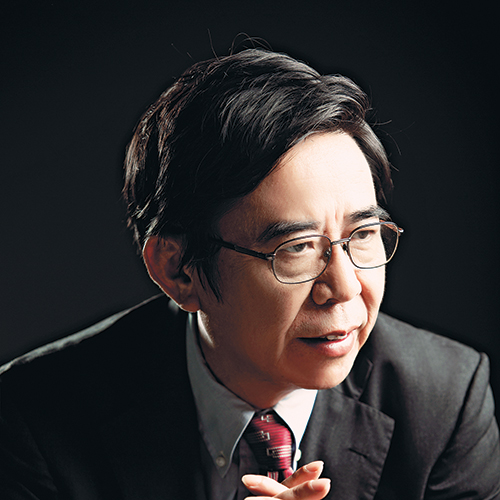
The triboelectric sensor provides a novel and energy-saving solution to the design and operation of robotic exoskeletons, and will have far-reaching impacts on rehabilitative and surgical technologies.
Professor Xu Guo Qin, Director, NUSRI-SZ
For example, recent breakthroughs have been reported in two research projects conducted at NUSRI-SZ. One team has proposed a triboelectric bidirectional sensor-integrated exoskeleton as a low-cost, customisable solution for monitoring the movable joints of the human upper limbs, which shows great potential for application in robotic automation, healthcare and training. Another team has used Helmholtz coils to design a wireless positioning and wireless charging system that is suitable for wireless capsule endoscopy and other related biomedical and industrial applications.
Professor Xu Guo Qin, Director of NUSRI-SZ, notes that these research achievements are relevant not just for China and Singapore but the world at large: “The triboelectric sensor provides a novel and energy-saving solution to the design and operation of robotic exoskeletons, and will havefar-reaching impacts in the development of advanced rehabilitative and surgical technologies. The project on wireless positioning and wireless charging allows for more operational convenience and improved accuracy in both the positioning and orientation of smart medical devices, such as capsule endoscopy for health examination and diagnosis in the human body.”
The other three research institutes rounding out the NUSRI China programme are the NUS (Chongqing) Research Institute (NUSRI-CQ), which Prof Xu also heads; Tianjin University–NUS Joint Institute in Fuzhou (NUSRI-FZ); and NUS Guangzhou Research Translation and Innovation Institute (NUSRI-GZ). All engaged in education, innovation and technology entrepreneurship, they provide a gateway for Singapore start-ups to access the China market and reciprocally help Chinese start-ups attempting to break into Singapore.
NUS is also eyeing trends closer to home and fostering ties with its ASEAN neighbours, especially Indonesia. The University has helped to grow Indonesia’s innovation and entrepreneurship ecosystem in recent years by, among other moves, opening BLOCK71 locations in Jakarta, Bandung and Yogyakarta, and introducing the NOC Southeast Asia programme (which covers these three Indonesian cities, plus Ho Chi Minh City). In July 2021, NUS deepened its involvement by penning an agreement with two of the country’s top institutions, Universitas Gadjah Mada (UGM) and Universitas Indonesia (UI). Under this partnership, the three universities will establish a venture creation programme in Indonesia, and NUS Enterprise will offer scholarships for Indonesian students from UGM and UI to attend NUS’ MSc in Venture Creation programme.
CHAPTER BY CHAPTER
Indonesia is also where many NUS alumni call home, and joining NUS Alumni Jakarta Chapter helps them to connect with one another and build meaningful personal and professional relationships. COVID-19 has admittedly made things difficult, as the last time alumni met in person was at a networking dinner in March 2020, right before the pandemic hit with full force. However, Jakarta Chapter Chairperson Mr David Suwarto (Business ’09) notes that the group has since held several virtual get-togethers with invited guest speakers. A WhatsApp group has also been created for members to share all kinds of information, from COVID-19 support resources and ‘fake news’ warnings to cryptocurrency investment tips and celebratory messages on festive occasions.
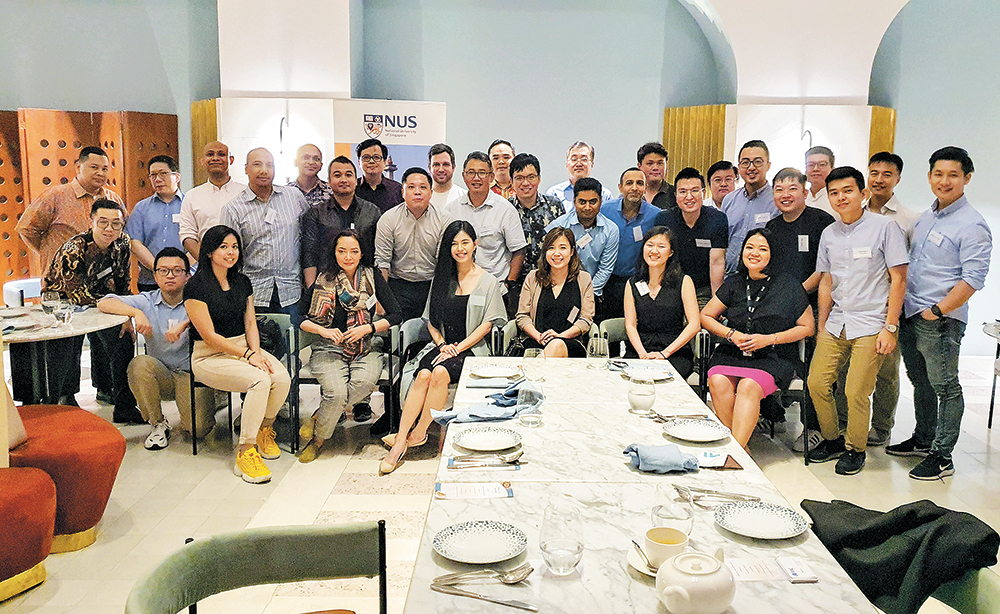 NUS Alumni Jakarta Chapter last met in person at a networking dinner in March 2020.
NUS Alumni Jakarta Chapter last met in person at a networking dinner in March 2020.
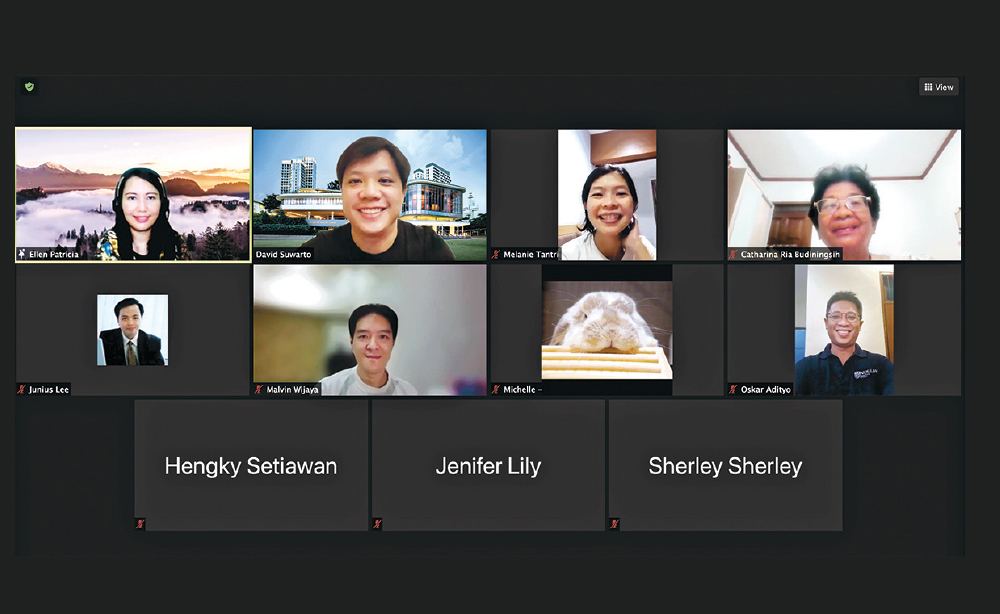 Virtual meetings allow Jakarta-based alumni to catch up with one another.
Virtual meetings allow Jakarta-based alumni to catch up with one another.
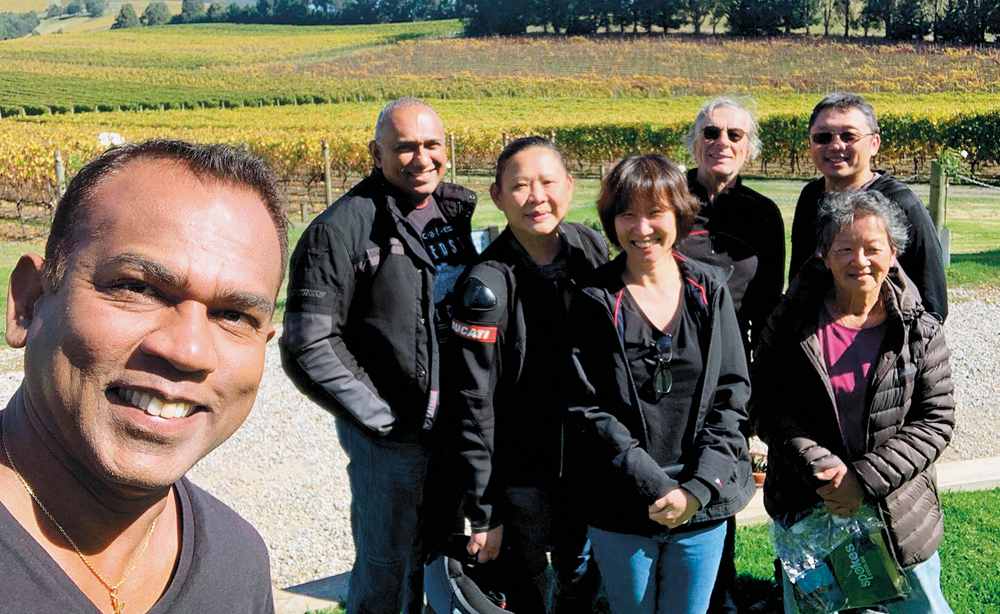 NUS Alumni Melbourne Chapter getting together in between lockdowns.
NUS Alumni Melbourne Chapter getting together in between lockdowns.
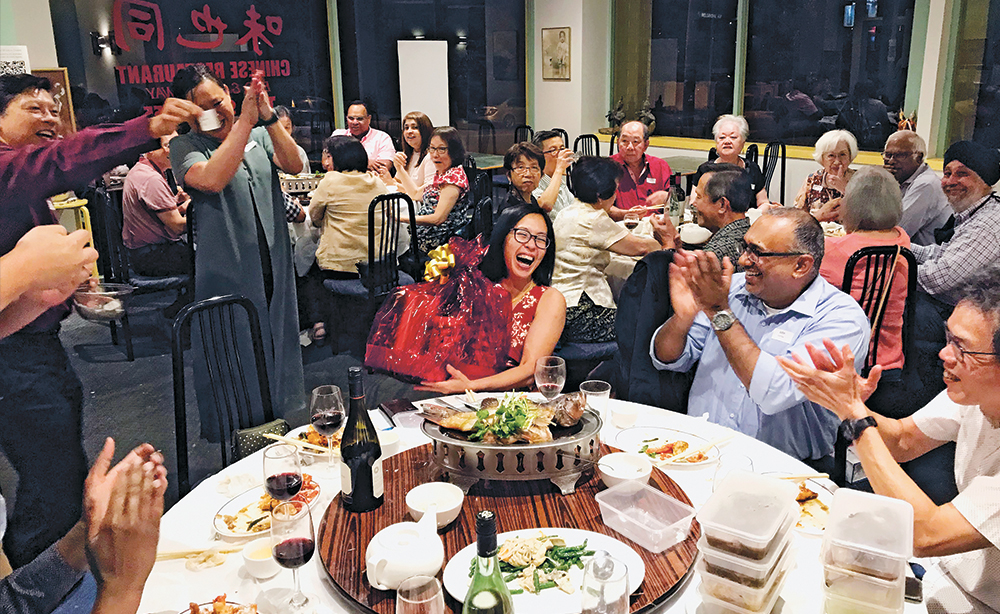 Melbourne-based alumni celebrated Chinese New Year 2021 together, in compliance with Victoria’s COVIDSafe practices.
Melbourne-based alumni celebrated Chinese New Year 2021 together, in compliance with Victoria’s COVIDSafe practices.
“Although we can find a lot of information online, we need to hear from people we trust before we go into something or engage a particular service,” says Mr Suwarto, who works in Jakarta as a TV series producer. “Trust is also important for collaborations or partnerships to come together. The NUS alumni network is very helpful to build trust between members and their personal networks.”
Down under in Australia, due to the fluctuating lockdowns and reopenings, NUS Alumni Melbourne Chapter has been able to organise some events but has had to cancel others. “This year, we were fortunate to have our Chinese New Year Dinner and our Australia Day barbecue, which dodged a lockdown,” says Dr Edna Yeo (Science ’93), who chairs the Melbourne Chapter. Members also stay in touch via WhatsApp, where they share information on online events and organise ad hoc activities in between lockdown periods, such as motorcycle rides through the rural countryside.
“Australian borders were closed to all non-residents in March 2020, which means most of us are missing our loved ones overseas,” says Dr Yeo, a management consultant. “Against this backdrop, social networks such as NUS alumni chapters are being recognised for the valuable resource they are, and gaining renewed traction, in developing and maintaining friendships and camaraderie.”
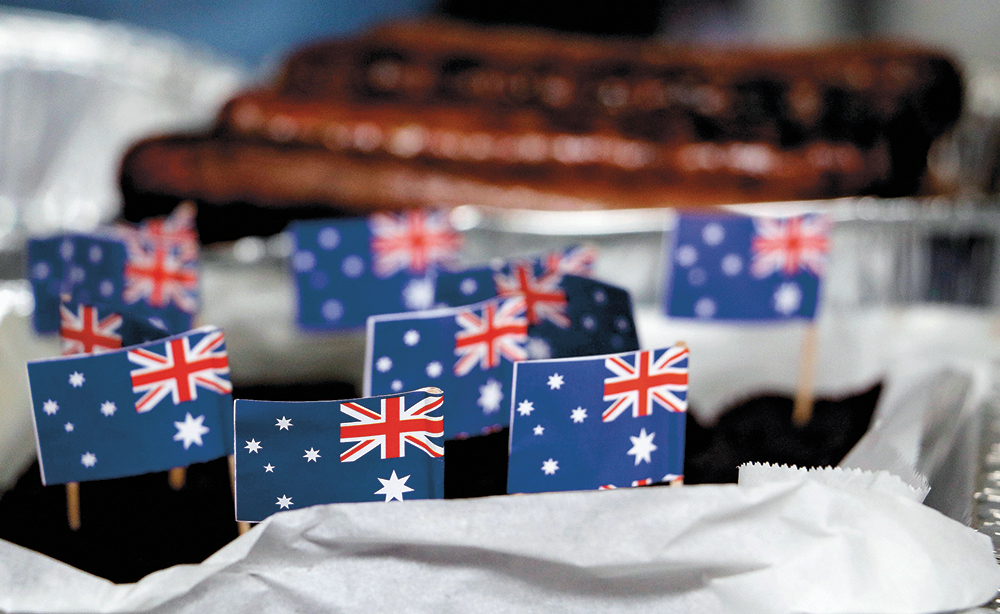 Over 50 guests attended NUS Alumni Melbourne Chapter’s Australia Day barbecue in January 2021.
Over 50 guests attended NUS Alumni Melbourne Chapter’s Australia Day barbecue in January 2021.
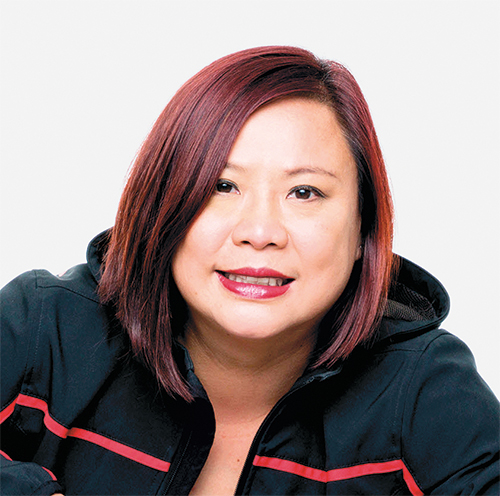
Most of us are missing our loved ones overseas. Against this backdrop, social networks such as NUS alumni chapters are being recognised for the valuable resource they are, and gaining renewed traction, in developing and maintaining friendships and camaraderie.
Dr Edna Yeo, Chairperson, NUS Alumni Melbourne Chapter
Similar stories can be found across all 20 NUS Alumni Overseas Chapters — the newest of which is the Chongqing Chapter, established in May 2021. This Chapter works together with NUSRI-CQ to offer a global platform for the integration of research, education and enterprise in western China. On 8 August, the group held its first online event, where alumni based in Chongqing got to know one another and heard about NUSRI-CQ’s research activities from its Director, Prof Xu.
CALLING ON THE ALUMNI DIASPORA
Scattered across the globe, NUS alumni are as diverse in their pursuits as they are in their place of residence — be it giving back to society or leading a multinational corporation. Through their chosen vocations, they are in their own ways helping to raise NUS’, and Singapore’s, international profiles.
Among the ranks of
Fortune Global 500 companies, Shanghai-based Dr James Geng (Public Policy ’11) serves as Chairman and President of Greenland Financial Holdings Group, a subsidiary of property developer-turned-conglomerate Greenland Group. “Since our core business is in China and
thanks to the good job done here to manage the pandemic, our work has not been significantly affected,” says Dr Geng. COVID-19 has accelerated its digital transformation, but the Group remains committed to implementing its internationalisation agenda. For Greenland Financial, Singapore — given its status as a major financial and trading hub — is a key strategic market.
Greenland Financial’s dealings in Singapore mainly involve two projects: the establishment of a digital wholesale bank and the issuance of a real estate investment trust on the Singapore Exchange, both currently in preparation. In this respect, the time Dr Geng — who is also an NUS Alumni Advisory Board member and Chairperson of NUS Alumni Shanghai Chapter — spent pursuing a Master in Public Management at NUS has proved valuable. “The programme gave me global insight into the challenges faced by different governments, and I received an unexpected opportunity to work at the Monetary Authority of Singapore,” he recalls. “While working with Singapore’s public departments and institutions, I was able to observe Singapore’s financial regulatory system closely and understand how it works from the inside.”
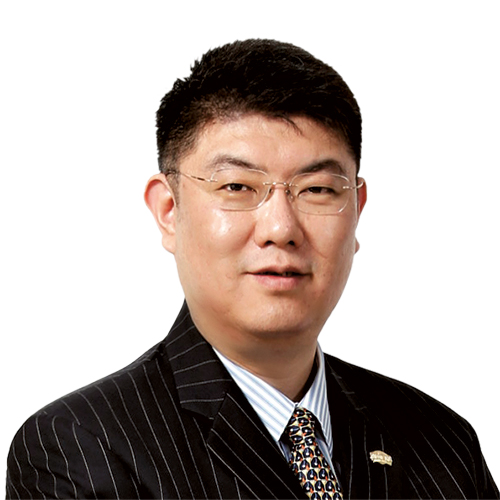
The Master in Public Management programme at NUS gave me global insight into the challenges faced by different governments.
Dr James Geng, NUS Alumni Advisory Board member
Other alumni, troubled by the hardships people are facing in the wake of COVID-19, have taken it upon themselves to make a difference and help those in need. From their base in the United States, Mr Ang Yu Qian (Design and Environment ’13) and Ms Kloe Ng (Design and Environment ’13) — co-founders of edtech start-up Out Of The Box (OOTB) — embarked on a social initiative early this year to help children from less-privileged families both in Singapore and stateside. Their solution? A free, portable cardboard box that can be unpacked to form a table and stool, and which comes with stationery and other learning materials, to help children with home-based learning.
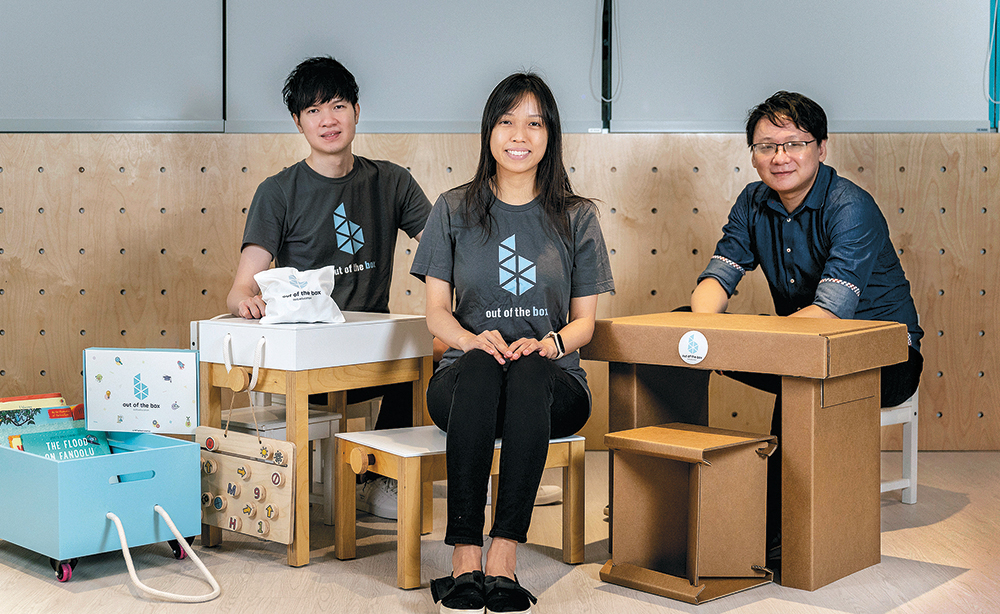 OOTB’s Mr Ang (left) and Ms Ng (middle) with their friend Mr Wang Yichao (Design and Environment ’13), who is helping with distribution efforts in Singapore.
OOTB’s Mr Ang (left) and Ms Ng (middle) with their friend Mr Wang Yichao (Design and Environment ’13), who is helping with distribution efforts in Singapore.
More than 150 free cardboard units have been distributed to date, and OOTB is currently developing artificial intelligence-based learning software which will be integrated with the mobile classrooms. “Early childhood education is critical for children’s development and growth,” says Mr Ang. “We are working to help children learn better and hope to maintain a social angle in our venture, where we can continue to help underserved children all over the world.”
When India became overwhelmed by its second wave of COVID-19 this year, a group of NUS alumni joined forces with peers from Nanyang Technological University (NTU) and Singapore Management University (SMU) to launch a crowdfunding campaign called Singapore Universities’ Mission Oxygen (SUMO) in April. Spread across Singapore, the Philippines and India, Team SUMO managed to raise $235,000 from 902 supporters in 15 days, with the funds being used to purchase and deploy 200 oxygen concentrators to various parts of India — doubling their initial target of 100 units.
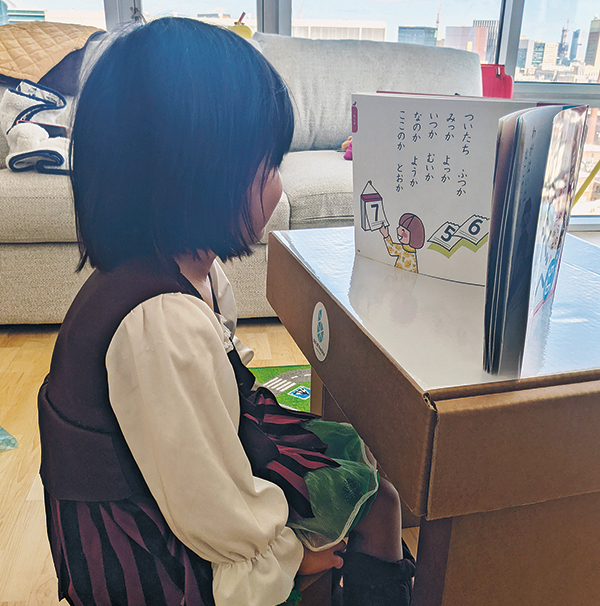 OOTB is addressing children’s home-based learning needs.
OOTB is addressing children’s home-based learning needs.
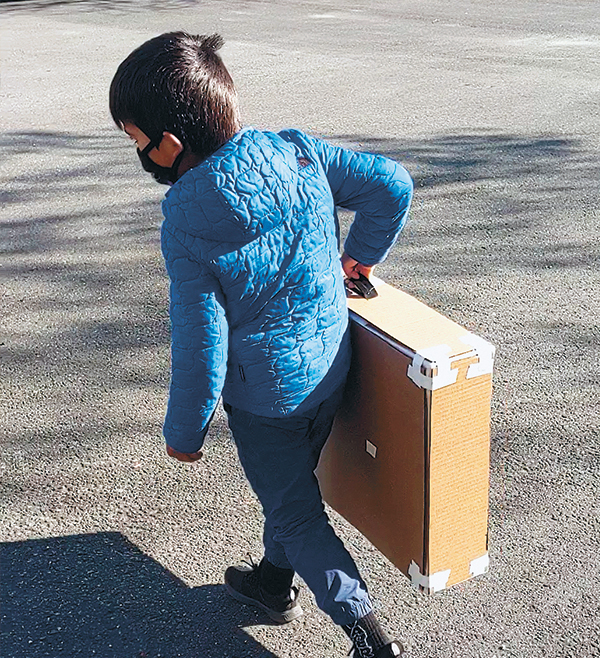 More than 150 free cardboard units have been distributed in Singapore and the US.
More than 150 free cardboard units have been distributed in Singapore and the US.
“The most memorable thing about SUMO was seeing how compassion and service can bring people together to save lives,” says Mr Vishal Ladha (Computing ’17), a SUMO volunteer. Born in India, he now works at an analytics start-up in Singapore. “It was a phenomenal experience and from the huge support we received, we realised there is so much good we can do if we, as alumni, come together.”
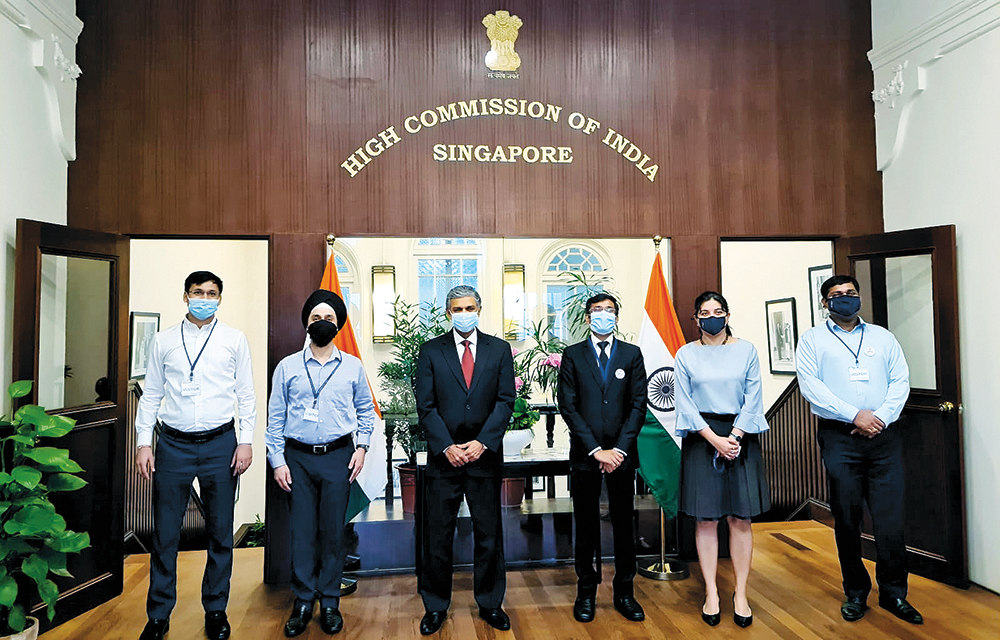 Mr Ladha (far left) and other members of Team SUMO visited the High Commission of India to Singapore.
Mr Ladha (far left) and other members of Team SUMO visited the High Commission of India to Singapore.
Ms Selly Amalina Muzammil (Arts and Social Sciences ’09), who has made fighting world hunger her life’s mission, feels the same way. Originally from Indonesia, she has led a peripatetic life both as a student — including a stint at NUS, where she obtained a Master in International Studies — and now in her career with the UN World Food Programme (WFP). Her work with the WFP has taken her from Jakarta to Egypt to New York City, where she recently relocated to join WFP’s UN System and Multilateral Engagement Division. “I will be working on various focus areas of relevance to WFP’s mandate to promote food security and contribute to global partnerships for the UN Sustainable Development Goals,” she says.
Living in different countries and meeting people from all walks of life, from different ethnic groups in Singapore to Iraqi refugees who had fled their country in search of safety, has given Ms Muzammil a unique perspective on life — one that is inherently global. “This pandemic is literally global and relatable to each and every one of us, albeit to varying degrees,” says the 2019 NUS Alumni Awards recipient. Even with travel restrictions in place, she argues, keeping up with global developments is not just desirable but vital. “We are all going through this challenging experience together and we have to overcome it together, with integrity, empathy, collaboration and, above all, humanity.”
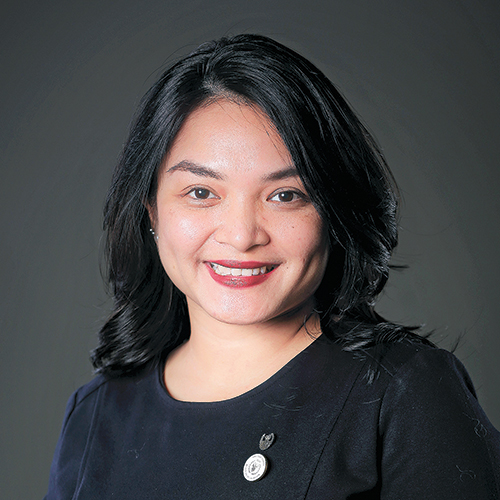
We are all going through this challenging experience together and we have to overcome it, with integrity, empathy, collaboration and, above all, humanity.
Ms Selly Amalina Muzammil, 2019 NUS Alumni Awards recipient
 A HEART TO SERVE
A HEART TO SERVE
The actions of Mr Ang and Mr Ladha embody the spirit of NUS’
Day of Service (DOS), which has been refashioned in light of the prolonged COVID-19 pandemic. Due to limits on physical gatherings as well as the increased demand for volunteers, DOS has evolved from a single-day event to a year-long platform for the NUS community to give back and help the less-fortunate. While NUS alumni, students and staff still came together for this year’s DOS on 4 September and took part in various community projects, many others have been doing good around the world over the course of the year.
Join in and volunteer all year round!
nus.edu.sg/alumnet/events/DOS
To further develop students’ social consciousness, NUS has introduced several new initiatives:
- Both local and international students can volunteer for Teach Singapore, a University-wide initiative which provides academic coaching and mentoring to disadvantaged children and youth in Singapore.
- The General Education curriculum has been enhanced this year to include a new pillar, Communities and Engagement.
- School of Computing students can take part in programmes run by the newly-launched NUS Centre for Computing for Social Good & Philanthropy (CCSGP), which aims to nurture tech leaders with a philanthropic ethos.
“The key point of education at NUS is not necessarily that students graduate and do well in life. Rather, we want them to become the best version of themselves — not just to strive for material success but to also remember to serve,” says Associate Professor Ben Leong, Director of CCSGP. Through his Centre as well as the other NUS initiatives, students will be exposed to problems that are at once local and borderless (e.g. income inequality, climate change, access to healthcare) and acquire the skills to tackle them.